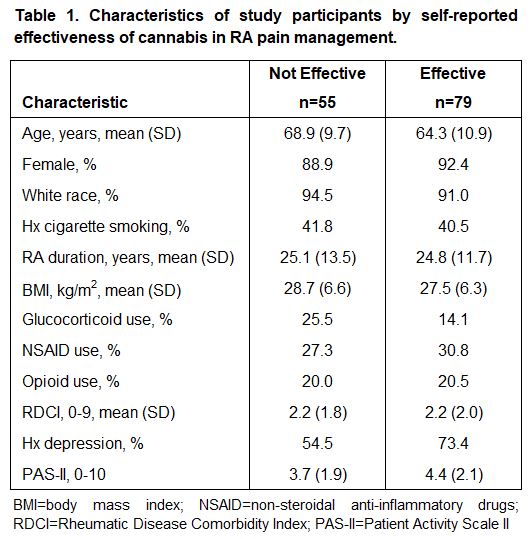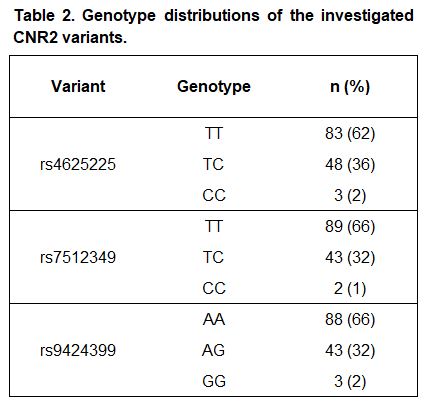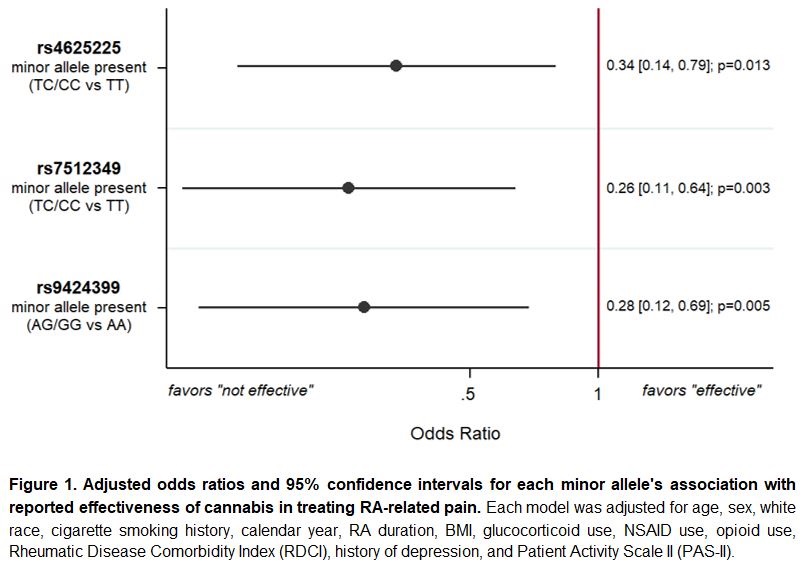Session Information
Session Type: Poster Session A
Session Time: 9:00AM-11:00AM
Background/Purpose: Cannabinoid receptor 2 (CB2) is a member of the cannabinoid receptor family and is encoded by the CNR2 gene. CB2 receptors are found primarily in immune cells, and their activation exerts anti-inflammatory effects. Genetic variants in CNR2 have been linked to pain, autoimmune disorders, and depression. The objective of this study was to examine relationships between CNR2 variants and self-reported effectiveness of cannabis in the treatment of RA-related pain.
Methods: Data were provided by adults with RA participating in FORWARD, The National Databank for Rheumatic Diseases, who provided blood samples and reported the use of cannabis or cannabis-derived products for the purpose of treating arthritis-related pain. Genotyping was performed with the Illumina Infinium Global Screening Array platform, and CNR2 variants with minor allele frequencies greater than 0.05 were included in this analysis (SNPs rs4625225, rs7512349, and rs9424399). Multivariable logistic regression was used to determine whether the presence of the minor allele in each variant was associated with self-reported effectiveness of cannabis in managing RA-related pain. Models were adjusted for age, sex, race, cigarette smoking history, RA duration, BMI, glucocorticoid use, NSAID use, opioid use, Rheumatic Disease Comorbidity Index (RDCI), history of depression, and Patient Activity Scale-II (PAS-II).
Results: A total of 134 participants met inclusion criteria, of whom 79 (59%) found cannabis effective in treating their RA-related pain. Respondent characteristics are presented in Table 1 and genotype distributions of the three variants are presented in Table 2. Adjusted models indicated that for all three variants, the presence of at least one copy of the minor allele was associated with reduced odds (rs4625225 OR [95% CI] = 0.34 [0.14, 0.79], p=0.013; rs7512349 0.26 [0.11, 0.64], p=0.003; rs9424399 0.28 [0.12, 0.69], p=0.005) of finding cannabis effective for pain management, compared to those homozygous for the major allele. (Figure 1).
Conclusion: Our results indicate that the perceived effectiveness of cannabis in the treatment of RA-related pain varies significantly by CNR2 genotype. The three variants appear to be in linkage disequilibrium and are also all silent, so a related variant not assessed by the array used in this study may be causative of the identified relationship. These results highlight the possible impact of genetic variations on the therapeutic potential of cannabis for arthritis pain management, which may be relevant for personalized medicine as legalization and medicinal use of cannabis continue to become more widespread in the United States. Further research is warranted to confirm these findings, to elucidate the underlying mechanisms, and to better understand the relationships between CB2 and pain, cannabis use, and any potential immunomodulatory effects.
To cite this abstract in AMA style:
Wipfler K, Zeiger J, Cornish A, Michaud K. Relationship Between Genetic Variants in Cannabinoid Receptor 2 and Self-Reported Effectiveness of Cannabis for Pain Management in Rheumatoid Arthritis [abstract]. Arthritis Rheumatol. 2023; 75 (suppl 9). https://acrabstracts.org/abstract/relationship-between-genetic-variants-in-cannabinoid-receptor-2-and-self-reported-effectiveness-of-cannabis-for-pain-management-in-rheumatoid-arthritis/. Accessed .« Back to ACR Convergence 2023
ACR Meeting Abstracts - https://acrabstracts.org/abstract/relationship-between-genetic-variants-in-cannabinoid-receptor-2-and-self-reported-effectiveness-of-cannabis-for-pain-management-in-rheumatoid-arthritis/



